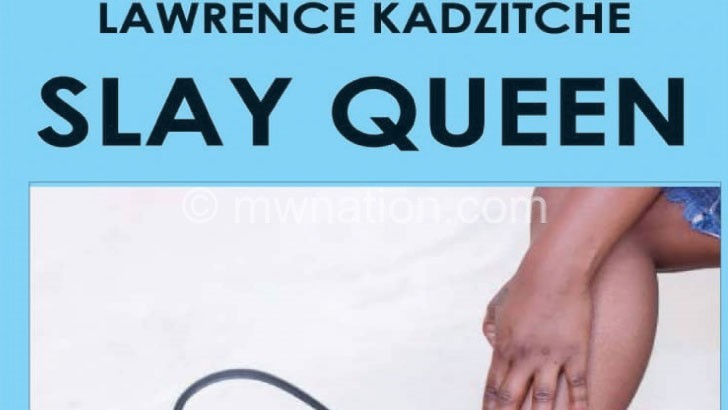Kadzitche writes again
Katakwe. That is not just a name. It is about being a crook.
And writer Lawrence Kadzitche brings out the crooked never-do-gooder character in his weekly Chichewa column.
What else can you say of a man who, caught in a sex escapade escapes through the window stark naked. When he flees to his house, he tells his wife bandits had robbed him and had taken away all his clothes. The wife wonders why they did not also snatch the condom he was putting on.

And Katakwe has a biting sense of humour. There is one story where his aunt pays a visit from the village. Seeing that Katakwe’s wife is always in miniskirts and other scanty outfits, the aunt believes that is proof for Katakwe’s being a miser: always buying his wives clothes meant for children!
In spite of the Katakwe shenanigans, Kadzitche, the man behind the character, is soft-spoken. He draws stories from the minutest diverse points of inspiration.
Since September 2001, Katakwe has graced the pages of this paper, the Weekend Nation. Kadzitche has also self-published (against all odds in Malawi) three Katakwe books Katakwe Kutauni, Katakwe Kumudzi and Katakwe Zaka 10, which celebrated the character’s 10 years. He also released a movie—Katakwe Kutauni.
Currently, he has finalised work on a compilation of short stories, Slay Queen, Collected Short Stories. According to him, the book is at the printers’ and will be on the streets later this month.
The up-coming 108-page book, which will be out this month, is an array of well-woven stories. The title story, The Slay Queen, brings out a mistress of the cheating and hooking game who gets entangled into her own web of promiscuity.
Kadzitche says the 10 short stories cover a wide-range of stories, from cheating pastors, promiscuous husbands, social ills, economic struggles and many more. Actually, there is one story on the thorny issue of homosexuality.
“Two of the stories were previously published in one form or the other. An example is Twinkle Twinkle Little Pastor, which I initially wrote when I participated in the Caine Prize organisers’ writers’ workshop in Cameroon,” says Kadzitche, who works with the Blantyre Water Board.
The then Malawi Writers Union (Mawu) president Stanley Onjezani Kenani recommended Kadzitche’s name for the workshop at Africa’s greatest literally prize. He attended the workshop with Shadreck Chikoti who is making in-roads in international writing and publishing.
The workshop culminated into an anthology, To See the Mountain and Other Stories.
Born in a family of nine, Kadzitche self-publishes in a day and age when few local publishers, if any, go for fiction works. That is unlike the days of his early formation when locally published books were readily available.
The question of whether the absence of a reading culture beyond the school syllabus has led to the downfall of the fiction publishing industry or vice-versa has often rocked the scene.
“I grew up in an age when we could read fiction from Claim Mabuku and the Malawi Book Service. For that matter, it was in those days when we read so many works through the National Library Service that I got to read a host of fiction works,” says Kadzitche, aged 48.
Apart from voracious reading, which was encouraged by his father, a forester, Kadzitche also remembers his mother’s stories prowess. He says, she narrated such stories as Cinderella, Snow White and the local Chamdothi.
“My father always encouraged me to read a lot. I read my first books Treasure Island and The Adventures of Tom Sawyer at a tender age. When I wrote my first story, Divided We Fall, it was inspired by Long John Silver in Treasure Island,” says Kadzitche.
His love for reading grew further with the writings of Jolly Max Ntaba in the Moni Magazine and the Police Magazine. He was taken with Ntaba’s sense of humour.
Kadzitche reckons his writing developed during his days at Magawa Secondary School when he wrote for ‘every available local outlet’ and even the South African magazine, Drum where he contributed This Thing Called Marriage.
He also recalls contributing vernacular plays for Malawi Broadcasting Corporation’s Nzeru N’kupangwa.
Kadzitche, a father of three, studied business administration at The Polytechnic between 1991 and 1995. That field, he says, did not stop him from perfecting his art as he developed it further through continued reading.
He also recalls being part of the British Council’s African writing programme, Crossing Borders, which shaped a host of Malawian writers, including Kenani, Chikoti, Chisomo Mdalla aka Nyamalikiti Nthiwatiwa, Ndongolera Mwangupili, Patrick Achitabwino and Pauline Kalumikiza Mbukwa.
“It surprises me that foreign governments should bring us such a great programme to improve writers when our own government is doing nothing. It is high time we valued and developed our writers and artists,” he quips.
He believes it was time government resuscitated the Malawi Book Service (MBS), which was a countrywide outlet for Malawian books.
As he seats, looking into the future, he feels story-telling sessions are the way to go. He has done it before at the British Council’s reading sessions.
“I wish to read my stories at the sessions Ekari Mbvundula hosts. That is one way to generate interest for the people to read the works,” he says, adding writing for him is challenging and he is always transforming.
A complete novel, for him, is also on the cards.





